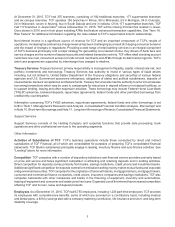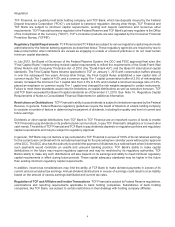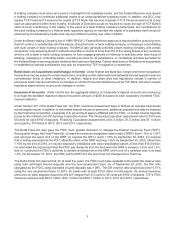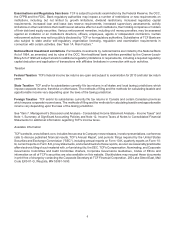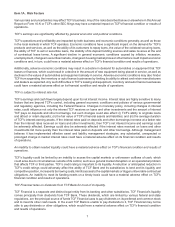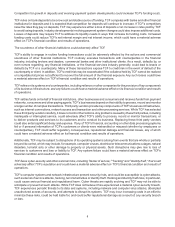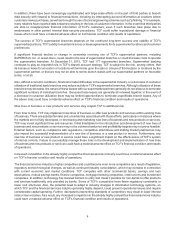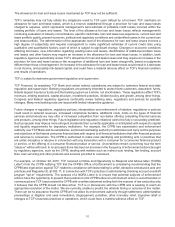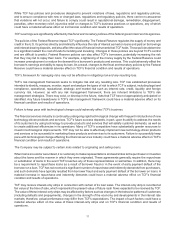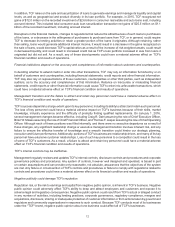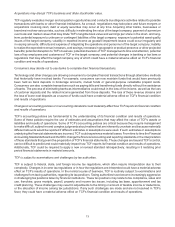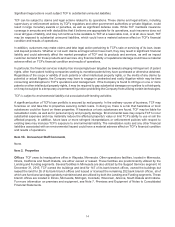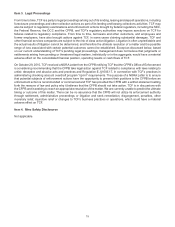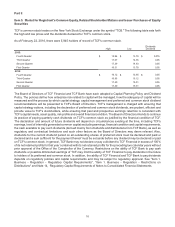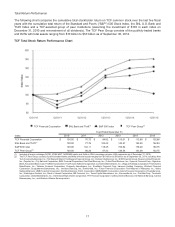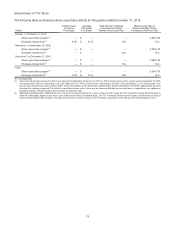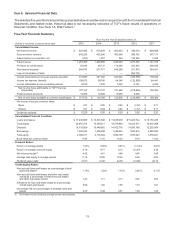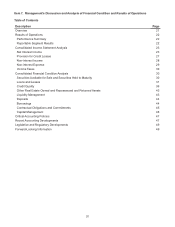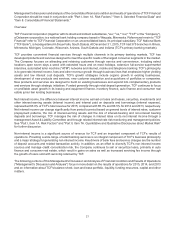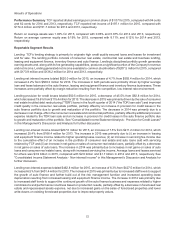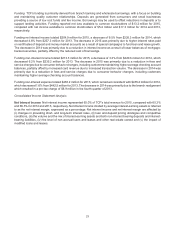TCF Bank 2015 Annual Report Download - page 28
Download and view the complete annual report
Please find page 28 of the 2015 TCF Bank annual report below. You can navigate through the pages in the report by either clicking on the pages listed below, or by using the keyword search tool below to find specific information within the annual report.13
Acquisitions may disrupt TCF's business and dilute stockholder value.
TCF regularly evaluates merger and acquisition opportunities and conducts due diligence activities related to possible
transactions with banks or other financial institutions. As a result, negotiations may take place and future mergers or
acquisitions involving cash, debt or equity securities may occur at any time. Acquiring other banks, businesses or
branches involves various risks, such as: difficulty in estimating the value of the target company; payment of a premium
over book and market values that may dilute TCF's tangible book value and earnings per share in the short- and long-
term; potential exposure to unknown or contingent liabilities of the target company; exposure to potential asset quality
issues of the target company; volatility in reported income as goodwill impairment losses could occur irregularly and
in varying amounts; difficulty and expense of integrating the operations and personnel of the target company; inability
to realize the expected revenue increases, cost savings, increases in geographic or product presence or other projected
benefits; potential disruption to TCF's business; potential diversion of TCF management's time and attention; potential
loss of key employees and customers of TCF or the target company; and potential changes in banking or tax laws or
regulations that may affect the target company, any of which could have a material adverse effect on TCF's financial
condition and results of operations.
Consumers may decide not to use banks to complete their financial transactions.
Technology and other changes are allowing consumers to complete financial transactions through alternative methods
that historically have involved banks. For example, consumers can now maintain funds that would have previously
been held as bank deposits in brokerage accounts, mutual funds or general-purpose reloadable prepaid cards.
Consumers can also complete transactions such as paying bills and transferring funds directly without the assistance
of banks. The process of eliminating banks as intermediaries could result in the loss of fee income, as well as the loss
of customer deposits and the related income generated from those deposits. The loss of these revenue streams and
the loss of lower-cost deposits as a source of funds could have a material adverse effect on TCF's financial condition
and results of operations.
Changes in accounting policies or in accounting standards could materially affect how TCF reports its financial condition
and results of operations.
TCF's accounting policies are fundamental to the understanding of its financial condition and results of operations.
Some of these policies require the use of estimates and assumptions that may affect the value of TCF's assets or
liabilities and results of operations. Some of TCF's accounting policies are critical because they require management
to make difficult, subjective and complex judgments about matters that are inherently uncertain and because materially
different amounts would be reported if different estimates or assumptions were used. If such estimates or assumptions
underlying the financial statements are incorrect, TCF could experience material losses. From time to time the Financial
Accounting Standards Board and the SEC change the financial accounting and reporting standards or the interpretation
of those standards that govern the preparation of TCF's financial statements. These changes are beyond TCF's control,
can be difficult to predict and could materially impact how TCF reports its financial condition and results of operations.
Additionally, TCF could be required to apply a new or revised standard retrospectively, resulting in it restating prior
period financial statements in material amounts.
TCF is subject to examinations and challenges by tax authorities.
TCF is subject to federal, state, and foreign income tax regulations, which often require interpretation due to their
complexity. Changes in income tax regulations or in how the regulations are interpreted could have a material adverse
effect on TCF's results of operations. In the normal course of business, TCF is routinely subject to examinations and
challenges from taxing authorities, regarding its tax positions. Taxing authorities have become increasingly aggressive
in challenging tax positions taken by financial institutions. These tax positions may relate to tax compliance, sales and
use, franchise, gross receipts, payroll, property and income tax issues, including tax base, apportionment and tax
credit planning. These challenges may result in adjustments to the timing or amount of taxable income or deductions,
or the allocation of income among tax jurisdictions. If any such challenges are made and are not resolved in TCF's
favor, they could have a material adverse effect on TCF's financial condition and results of operations.


